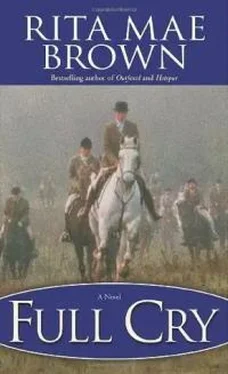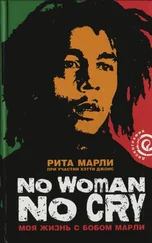The field, large for a Thursday at twenty-one, looked like a nineteenth-century aquatint; the packed snow flew off hooves like large chunks of confetti. Faces, red from cold and exertion, radiated intensity and happiness.
The fox, a quarter of a mile ahead of the pack, swung round the other side of the hayfield, turning back toward his den not far from the simple Federal-style house.
Sister, in her eagerness, had gotten a bit forward of her field. She soared over the black coop, snow still tucked along the planks, then paused a moment to watch others take the obstacle.
Tedi, perfect position, arched over the coop, the sky bright blue above her. Edward followed, derby on his head, hands forward, eyes up—not as elegant as his wife, but bold. Behind Edward came Ronnie, light, smiling, another one with perfect position. Xavier followed Ronnie, lurching a bit on Picasso. Xavier really had to lose weight. It was affecting his riding. After Xavier, Clay took the jump big. That was Clay, clap your leg on the horse and devil take the hindmost. Once Clay cleared, Crawford, keen to be up front, tucked down on Czpaka and thundered over: not pretty but effective. Walter on Clemson, his tried and true, took the fence in a workman-like manner, no muss, no fuss, all business. Sam took his fences like the professional he was, with as little interference with the horse as possible.
She heard the horn, figured she better move along. She asked Keepsake for speed, which he readily supplied despite the snow. Keepsake had a marvelous sense of balance.
Sister looked for brain first, balance second. Anyone could pick apart a horse, a hind end a trifle weak or a shoulder slope too straight. For Sister, conformation was a map not a destination. The way the horse moved meant everything to her. As her mother used to say, “Movement is the best of conformation.”
Another jump, an odd brush jump, level on top, sat in the turkey foot wire fence that enclosed the back acres. Keepsake glided over, smooth as silk. They turned toward higher ground, while a soft grade upward, given the snow, burned calories.
On top of that meadow, the 1809 house and outbuildings in clear view, Sister saw a red fox running toward the toolshed. The outermost building, its white clapboard matched all the others.
She said nothing as hounds were speaking. It’s incorrect to call out “Tallyho” if the hounds are on.
Viewing the fox is as good as a twenty-minute run. The field excitedly looked in the direction of Tedi’s outstretched arm, her lady’s derby in her hand. Tedi did not yell out but did the proper thing when viewing a fox. She removed her derby, pointing it in the direction of the fox. She continued this for four or five strides as there was no slowing down, then she clapped the derby on her head realizing she’d snapped her hat cord in her eagerness to confirm her view.
“Bother!” she muttered under her breath as the hat cord swung from side to side on her neck, its small metal snap cold when it touched bare skin.
Within four minutes the fox popped into his den, hounds marked it, Rassle turning a somersault of delight, which made the whole field laugh. Shaker blew “Gone to Ground,” praised his charges, mounted with a wince, and looked at Sister.
Like a schoolgirl bursting with eagerness, she said, “Let’s hunt the back acres. If we don’t pick up anything in twenty minutes, we can call it a day. I mean, unless you’re hurting.”
He shot her a baleful stare. “Who’s hurting?” He spoke softly to the hounds, “Good hounds, good hounds, pack into me now.”
“More?” Ruthie, sleek and fit, was as eager as Sister.
“Yes,” Cora happily told her.
“Yay!” the young entry cheered.
“All right, now. No babbling,” Asa gruffly instructed them, although he was as thrilled as they were. A good hound always wants to hunt. “Discipline, young ’uns. Discipline’s what makes a great foxhound and a great fox. You’re a Jefferson hound, you know, not some raggle-taggle trash.”
They obediently quieted, but Ribot, Ruthie, and Rassle couldn’t help themselves. As they walked to the next cast, they’d jump up to look over the pack, to see Shaker.
“Jack-in-the-boxes.” Tedi, alongside Sister, smiled.
“Isn’t it wonderful?” Sister had tears in her eyes from the run, from happiness.
“Yes.” Tedi rode a few paces, then said, “Pity so few people feel that way.”
Sister, without rancor, replied, “Their own damn fault for the most part.”
“I agree,” Tedi said, thinking back to the joy she and Edward shared when both their daughters were alive, the family following the hounds, the pace like lightning. She’d had her share of happiness and her share of sorrow, and she thanked God for both. She knew Sister did, too.
Tedi wondered if this was a function of age or intelligence. She set aside age: she knew far too many immature, selfish, querulous old people. They’d been bloody bores as young people and had grown worse with the years.
Some people figured out the secret to happiness. Others didn’t. The problem with the ones who didn’t was they got in the way of the ones who did. Like psychic vampires, they’d swoop down on the happy. Eventually, one learns to dispense with their entreaties, manipulations, and excuses.
Tedi thought Nola, had she lived, might have become panicked in middle age as younger beauties challenged her fiefdom. Whether Nola could have gotten through it, she didn’t know. She wondered, too, how young Ray would have matured. He had had an uncommon sweetness to him, far sweeter and softer emotionally than her own eldest daughter. Tedi loved Sister for many reasons, not the least because Sister was lovable. But what bound them like a steel cable was the shared loss of their children.
Hounds found another line on the southwestern side of Old Orchard, down by the remains of a railroad spur bridge, the railroad long defunct. This run, although brief, took them over hills like camel humps. When folks made it back to the trailers, they were tired but exhilarated.
Tedi, Isabelle, and Ronnie had brought a tailgate. Despite the cold, people grabbed sandwiches, hot coffee or tea, and Ronnie’s signature brownies, chewy with tiny bits of bitter chocolate scattered throughout.
Sam, quiet and withdrawn, took a sandwich back to the tack room of Crawford’s large trailer. He sat on an overturned bucket, sandwich in one hand, while dipping the bit of Nike’s bridle in a bucket of warm water with the other hand.
He was surprised when X’s large bulk loomed on the other side of the door window.
X opened the door, stepped inside, and closed it behind him. “You’re one lucky bastard.” Sam kept at his task. X continued, “I know you were drunk, drove off the road, and once again your brother saved your black ass.”
Sam glared up at him. “You know a lot, don’t you?” “Cars passed you until you were hauled out. No one told Crawford. You’re lucky.”
“And are you going to tell Crawford?”
“No.” X folded his arms across his broad chest. “No, I’m not.”
“White of you.”
X leaned down. “Listen, you worthless piece of shit. You’ll fuck up again. You’ll do yourself in. Why should I get my hands dirty?”
“That why you came back here? To tell me this?”
“No, actually. I came back here to tell you that I think you know more about what’s going on than you’re telling. For all I know, you killed those winos and Donnie. I know Donnie was in AA but couldn’t go thirty days without a drink. I know a lot more than you think I know.”
“Let me tell you what I know.” Sam stood up, hung the bridle over its hook, put the sandwich on the saddle seat. “I know that you and Clay Berry are old friends, right ball and left ball. I know that Clay will receive a six-figure check from the insurance company. And I wouldn’t be surprised to discover you two split that check.”
Читать дальше












